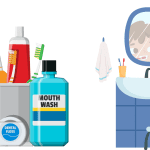Dental hygiene is a fundamental aspect of maintaining optimal oral health. It encompasses a series of practices and habits that aim to prevent oral diseases, maintain the cleanliness of teeth and gums, and promote an overall healthy mouth.
Regular dental hygiene practices include brushing teeth at least twice a day with fluoride toothpaste, flossing to remove plaque and debris from between teeth, and rinsing with an antiseptic mouthwash. These habits help prevent the buildup of plaque, a sticky film of bacteria that can lead to cavities, gum disease, and bad breath.
Professional dental cleanings, typically recommended every six months, play a crucial role in dental hygiene. During these appointments, dental hygienists use specialized tools to remove stubborn plaque and tartar that may not be effectively addressed through regular brushing and flossing.
Maintaining proper dental hygiene is not only essential for preventing oral issues but also contributes to overall well-being. Poor oral health has been linked to systemic conditions like heart disease and diabetes.
Incorporate good dental hygiene practices into your daily routine, schedule regular dental checkups, and enjoy the benefits of a healthy and confident smile.
#DentalHygiene #OralCare #HealthySmile #DentalRoutine
Dental hygiene is important for kids of all ages! Here are some tips to help keep their teeth clean and healthy: Why Is Dental Hygiene Important For Kids? Dental hygiene is important for kids for a few reasons. First, good dental hygiene habits can help prevent cavities. Second, cavities can…


